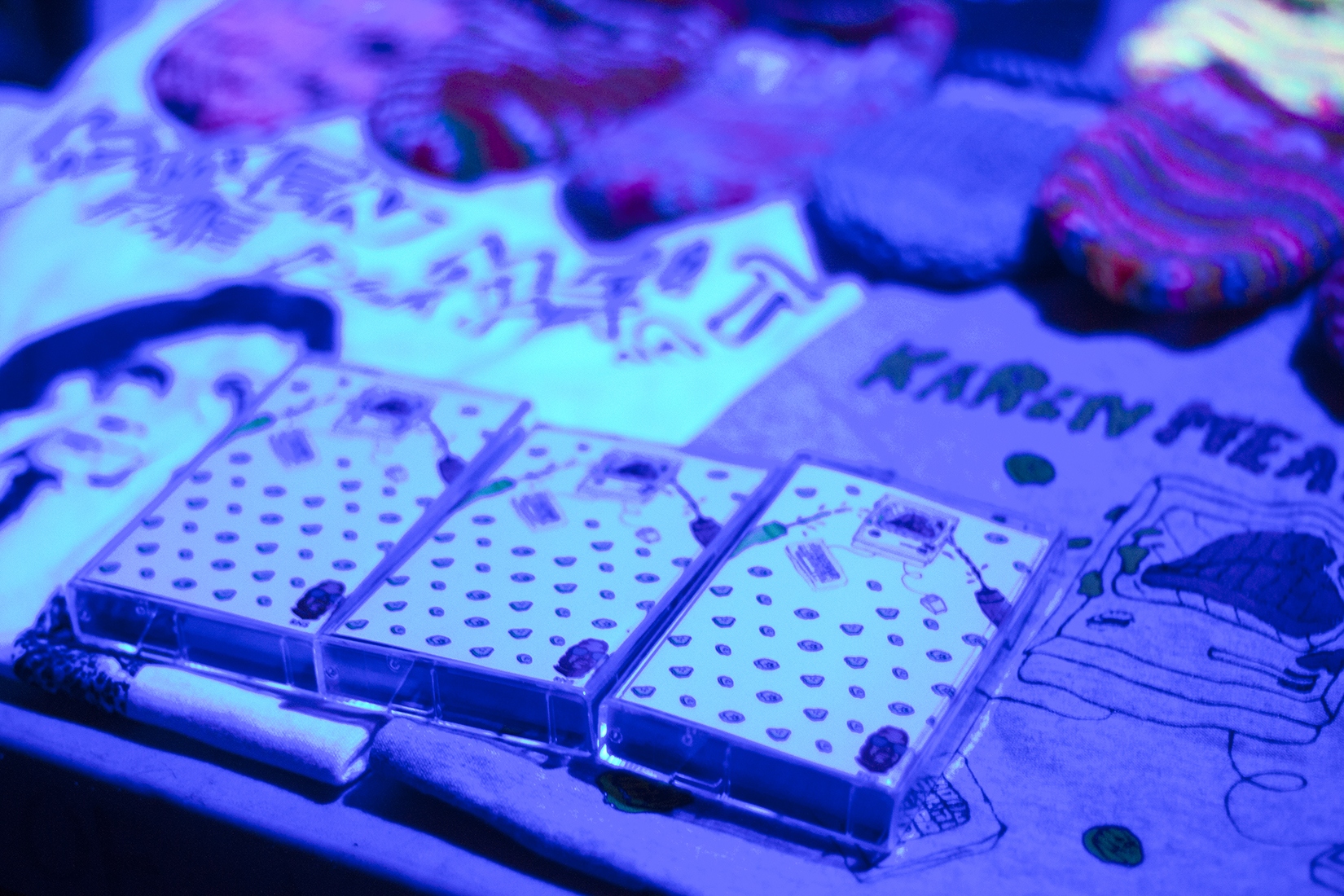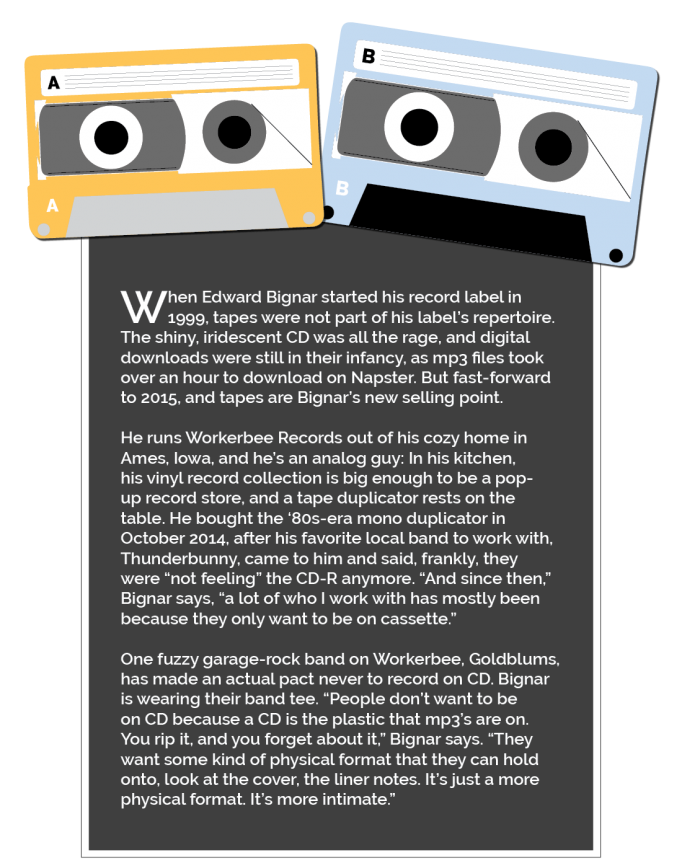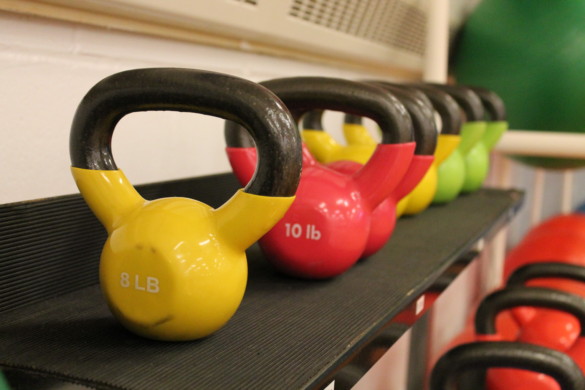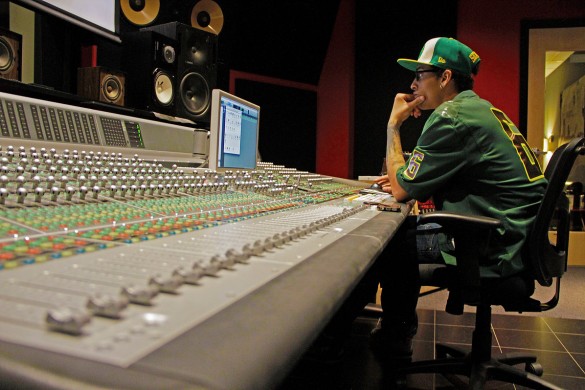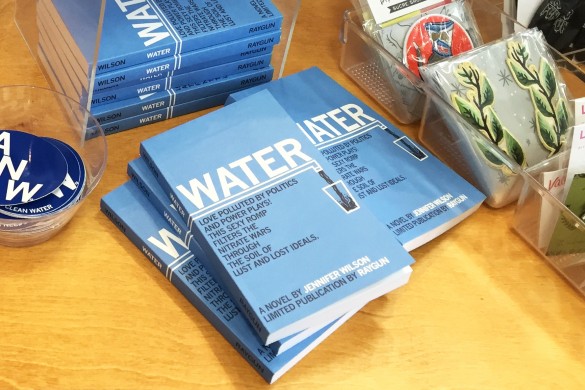The tapes were supposed to be here by now. Yeah, the trip from California to an obscure DIY venue in Des Moines is a long one. But this party was for them.
“Thanks for coming to our tape release show,” says Luke Belknap from his drum set, “without the tapes.”
Everything about tonight’s non-release show has been imperfect. The single bald light bulb illuminating the non-stage was knocked over from its stand and shattered in between sets. No replacement came. The vocals were inaudible, maybe because the venue lacked any form of acoustics. More likely because Luke sang them through an old telephone head duct-taped to the stand.
But for bands that thrive on imperfection, tonight’s non-release show was perfectly fitting — in the same way releasing tapes has been. While the tape’s hiss and its grainy effect have stigmatized it as the lowest-quality music medium, for lo-fi bands like these, that’s why tapes work best. “The fundamental idea of [a cassette] is that it’s just really raw,” says Luke’s brother, Wesley, who plays bass in their brotherly lo-fi duo, Sinkholes. “It reflects the idea of the sound that we make a lot more than the idea of a CD.”
The idea of a CD, in the DIY music world at least, is as dead as floppy disks. Even in the world period, CD sales were slashed in half between 2009 and 2014, down from 136.4 million sales to 62.9 million, victims to digital enemies like Spotify and SoundCloud.
The narrative’s familiar. While tapes seemed to have disappeared from relevance within a few short years of the CD’s arrival, to the DIY community, they never left in the first place. Besides costing dozens of times more to produce and master, the CD is also a cousin to the digital revolution that cassette enthusiasts have tried to resist. The CD is ripped to a computer and forgotten, missing the physical intimacy of analog reels and ridges. It’s why, both aesthetically and financially, the tape has survived the digital age and the CD’s long-ago coup d’état, at least in the underground scene. And even as they rise in popularity for their novelty appeal — on the backs of iPhone cases, on notebook covers, on graphic tees sold at Hot Topic and Target alike — their sheer convenience to produce cheaply has carried them this far in the first place.
Luke is expecting 50 of them to arrive in the mail within the next week or so from the Cali-based label Weiner Records, the tape-only sublabel to Burger Records — today’s landslide leader in tape releases. With the label’s 100-copy distribution price tag at $250, it was the first time Luke had ever paid more than a few bucks to put out music. Previously, he made tapes at home, on his DIY label Taikonaut Tapes — the recordings, art, and packaging all done by hand.
With Weiner, the main perk was exposure possibilities, since Weiner will distribute the other 50 tapes at various record stores across the country. But the other plus was that, this time, he didn’t have to go hunting for the actual tapes and tape cases.
“Have you heard of Half-Price Books?” Luke asks. “They have a great dumpster.”
* * *
The growing demand in tapes is not something that is provable on paper. Unlike CDs and vinyl and digital downloads, Nielsen SoundScan has neglected to share tape-sale data in year-end reports since the turn of the century, instead lumping in the meager numbers with total album sales.
The only evidence has been by observation — things like Cassette Store Day, which was created in September 2013 for the tape’s 50th anniversary. That year, Nielsen recorded tape sales at roughly 54,000 — up from 2009’s 34,000, but a speck compared to 2000’s 77.2 million. (An even smaller speck compared to 2000’s total album sales: 785 million. Today, just 257 mil.) And after 2014’s Cassette Store Day, the Record Association of America published a bar graph illustrating that tape sales have been virtually zero for the past six years, the title “Thanks for the Memories” written on clip-art-like cassette images.
The problem with these data, though, is that tape sales are not necessarily traceable anyway. Most have no bar codes to scan. People buy them in cash from vans parked at house shows and merch tables set up in basement bars. Even the leading tape releasers, Burger Records, has itself recorded 350,000 tape sales since its inception in 2007, somehow escaping the ever-present scrutiny of big-dog data trackers like Nielsen.

Vaudeville Mews on Feb. 27.
Most of those sales have been in the past few years, as Burger has been putting out about 100 tape releases per year (along with hundreds on CD and LP, too). They’ve been at least partly responsible for propelling to prominence garage-rock acts like Ty Segall, King Tuff, The Black Lips, and Thee Oh Sees. They’ve reissued Built to Spill and Betty Davis on tape. They host two music festivals — one of which Weezer is headlining (the band used Burger to release Everything Will Be Alright In The End on tape). And Burger is even selling tapes through a repurposed cigarette dispenser at the Urban Outfitters in Omaha, Nebraska, specifically.
The odds that the tape will reach the nostalgic status of vinyl aren’t so likely, given limited accessibility — unless you own a crappy car or an old boom box. But this upward-climbing change, due in part to ambitious enthusiasts like Burger but also to iPhone cases and Urban Outfitters, is sort of odd to the tape releasers at DIY labels. As much as they love their cassettes for aesthetic, the only reason they thought tapes were cool was because they were practical.
* * *
In possibly the worst-ever year of the tape’s existence, Phillip Jerome Lesicko founded Manic Static Records as a tape-only label from his Pilsen, Chicago apartment. It was 2009, and as MySpace became the new favorite way to discover music, Lesicko was aiming to give his friends’ recordings a better home. Cassettes were cheap. Lesicko was broke. “At the time when we started it, CD-Rs were very prominent,” Lesicko says. “If you went to a straight DIY show in a basement, everyone had a CD-R and a T-shirt. But there were always those people that had cassettes. It was like a club — and not like an all-exclusive club. But it was like trading. You’d trade like you would as kids. Because it was so inexpensive.”
Lesicko can order 100 tapes from the National Audio Company in St. Louis — one of the last remaining cassette distributors in the country — for just $40. Then, dubbing it himself is free — and that’s compared to potentially several hundred dollars to press a CD and a couple thousand for vinyl records. Everything about Lesicko’s cassettes is done by hand. He cuts and copies and pastes all the art to the cassettes with Scotch tape. He prints things at FedEx. And he records the tapes in real-time — meaning if a tape is 45 minutes and he has an order of 100 tapes, well, he does not feel like doing the math. “There’s a lot of love and care that goes into it,” he says. “It’s not just about a business. I basically was bankrupt. It wasn’t like, ‘Oh, cool, I can pay my gas bill now.’ It’s straight up love of that aesthetic.”
The uniformity of his label’s artistic identity — which Lesicko describes as “controlled chaos” — is something an Iowa City–based label, Night People Records, inspired him to create. The man behind that label is Shawn Reed, who has been releasing tapes since the late ’90s. By the early aughts — just as tapes began their fall from shelves — 34-year-old Reed saw an opportunity for a primarily tape-based label. The Internet wasn’t yet an oversaturated vat of noise, but a simple way to reconnect with bands he’d met on tour and bring them to Night People. The Internet was still music’s friend. “From an underground music perspective, that was like the boom of underground tape labels,” he says.
Since then, Night People has put out over 240 releases, many of which have been from international bands. Reed has watched bands like the Australia-based Twerps go from releasing tapes with him to releasing acclaimed albums reviewed by Pitchfork. And Lesicko has, too: Fewer than two years after releasing Twin Peaks’ Sunken on tape — before the band’s first big-kid tour after graduating high school — Lesicko is marveling at how those same garage-rock punks are now touring Europe. “That’s the thing with cassettes,” Lesicko says. “They’ve definitely come out of the basement, and now they’re everywhere.”
But while these rungs of indie cred are exciting, they aren’t the point. Frankly, guys like Reed and Lesicko don’t care about popularity. Because a tape label is not a business that needs it.
“That’s the best thing about tapes,” Reed says. “They exist with labels like mine out of the necessity of not having money, but the really awesome thing about them is that, in a way, they get around the whole money game, period. I can put out super weird, f–d up music, and it’s not about makin’ a buck. It’s about the pure form of what this music is, and it being good, and it being art. It’s not about what’s sellable.”
* * *
Two weeks go by, and Luke still hasn’t received his tapes from Weiner Records in California. The tapes will come one day after Person Whale has a show at Vaudeville Mews, where perhaps they could have given a tape-release party a second shot. Or not, given that another band, Karen Meat & The Computer, had already booked their own tape-release party for the night.
Outside, in between sets, Luke’s brother, Wesley, breaks some news on the down low: Their duo, Sinkholes, has just been booked to play Des Moines’s indie music fest, GDP. “My goal by then, April 25, is to have a bunch of tapes ready to sell,” Wesley says. He is considering releasing on Weiner Records, “because why not?” he says. “I think they would dig what we’re doing.”
But April 25 is coming up fast, and what if the tapes are not here on time? Instead, for now, he and Luke will probably stick to homemade cassette recordings. It will be easy and convenient, within their control. They will dumpster dive for the cases, and it will not cost anything.
